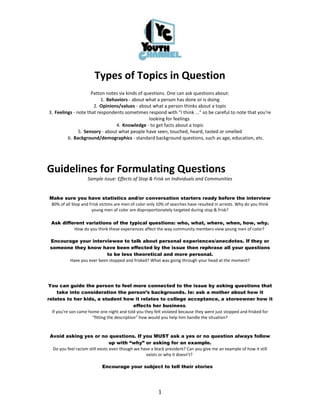
Guidelines for questions al
- 1. Types of Topics in Question Patton notes six kinds of questions. One can ask questions about: 1. Behaviors - about what a person has done or is doing 2. Opinions/values - about what a person thinks about a topic 3. Feelings - note that respondents sometimes respond with "I think ..." so be careful to note that you're looking for feelings 4. Knowledge - to get facts about a topic 5. Sensory - about what people have seen, touched, heard, tasted or smelled 6. Background/demographics - standard background questions, such as age, education, etc. Guidelines for Formulating Questions Sample Issue: Effects of Stop & Frisk on Individuals and Communities Make sure you have statistics and/or conversation starters ready before the interview 80% of all Stop and Frisk victims are men of color only 10% of searches have resulted in arrests. Why do you think young men of color are disproportionately targeted during stop & frisk? Ask different variations of the typical questions: who, what, where, when, how, why. How do you think these experiences affect the way community members view young men of color? Encourage your interviewee to talk about personal experiences/anecdotes. If they or someone they know have been effected by the issue then rephrase all your questions to be less theoretical and more personal. Have you ever been stopped and frisked? What was going through your head at the moment? You can guide the person to feel more connected to the issue by asking questions that take into consideration the person’s backgrounds. Ie: ask a mother about how it relates to her kids, a student how it relates to college acceptance, a storeowner how it effects her business. If you’re son came home one night and told you they felt violated because they were just stopped and frisked for “fitting the description” how would you help him handle the situation? Avoid asking yes or no questions. If you MUST ask a yes or no question always follow up with “why” or asking for an example. Do you feel racism still exists even though we have a black president? Can you give me an example of how it still exists or why it doesn’t? Encourage your subject to tell their stories 1
- 2. What was the relationship between communities and the police when you were growing up? Was Stop & Frisk an issue back then? Why or why not? Paint a hypothetical scenario for your interviewee to help them use their imaginations. What would happen if… What would happen if you got stopped and frisked in front of your neighbors? Follow up: What would your mom’s reaction be? Ask follow up questions it lets interviewers know your listening and oftentimes leads you to a more in depth answer. You mentioned your dad was a police officer. Do you think he would agree with how Stop and Frisk policies are conducted in NY? Why or why not? Avoid using jargon, define all complicated terms, but keep your wording as simple and straight forward as possible. Do you feel that Governor Cuomo should put an end to Stop &Frisk policies? Why or why not? Ask interviewees for their opinions on possible solutions and existing community resources to help solve the issue? What other programs do you think we should invest our tax money in that would help reduce violence in our neighborhoods? 2